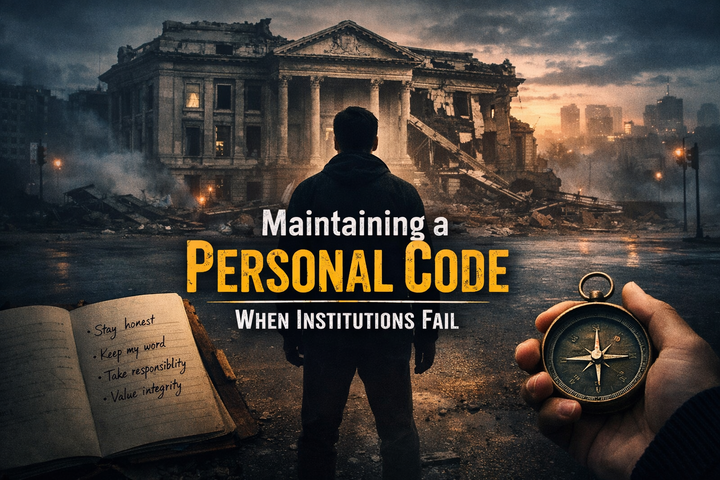Find Privacy-First Alternatives to Chat Apps
WhatsApp, Facebook Messenger, or iMessage ARE NOT PRIVATE.

In an age where our digital conversations are as routine as breathing, the apps we use to chat with friends, family, and colleagues hold immense power over our privacy.
Most of us have relied on mainstream messaging platforms like WhatsApp, Facebook Messenger, or iMessage for their convenience and widespread adoption.
But as these apps—often owned by tech giants—continue to harvest metadata, share data with parent companies, or fall short on default encryption, it’s time to rethink our choices.

If you value privacy and want to take control of your communications, there are excellent privacy-first alternatives to explore.
Let’s dive into why this matters and highlight some standout options to replace your go-to chat apps.
Thanks for reading ON SURVIVAL! Subscribe for free to receive new posts and support my work.
Why Privacy in Messaging Matters
When you send a message, you might assume it’s just between you and the recipient. But that’s not always the case.
Many popular chat apps collect metadata—information about who you’re talking to, when, where, and how often—even if the message content itself is encrypted.
For example, WhatsApp, owned by Meta, uses end-to-end encryption (E2EE) for messages, meaning only you and your recipient can read them. However, it still shares metadata with Meta, which can build a detailed profile of your social connections and habits.
That’s a goldmine for advertisers or, in some cases, prying governments.
Other apps, like Telegram, offer encryption but don’t enable it by default for all chats, leaving your conversations vulnerable unless you manually opt in.
Meanwhile, platforms like Facebook Messenger and Google Messages have spotty encryption policies, and their parent companies thrive on data collection.
The stakes are high: your chats could reveal sensitive personal details, political views, or professional secrets. Privacy-first alternatives aim to close these gaps by prioritizing security, minimizing data collection, and putting you in control.
What Makes a Chat App “Privacy-First”?
Before jumping into alternatives, let’s define what to look for:
- End-to-End Encryption (E2EE) by Default: Only the sender and recipient can access the message—no one else, not even the app’s developers.
- Minimal Metadata Collection: The app shouldn’t track who you’re talking to or when.
- Open-Source Code: Transparency in how the app works, allowing experts to audit it for vulnerabilities.
- No Ties to Big Tech: Independence from companies with a history of data exploitation.
- Anonymity Options: Bonus points if you can sign up without linking your phone number or email.
With these principles in mind, here are some of the best privacy-first chat apps to consider switching to in 2025.
Top Privacy-First Alternatives
Signal

- Why It Stands Out: Signal is the gold standard for privacy-focused messaging. It offers E2EE for all messages, calls, and group chats by default, using the open-source Signal Protocol (trusted by apps like WhatsApp too). Unlike WhatsApp, Signal collects almost no metadata—just your phone number and last connection date—and it’s run by a nonprofit with no profit motive to sell your data.
- Features: Text, voice, and video calls (up to 40 participants), disappearing messages, and a clean interface.
- Downside: Requires a phone number to sign up, which might deter the ultra-privacy-conscious.
- Who’s It For?: Anyone seeking a drop-in replacement for WhatsApp with better privacy guarantees.

- Why It Stands Out: Session takes anonymity to the next level by ditching phone numbers entirely. Instead, it assigns you a unique Session ID and routes messages through a decentralized network using onion routing (similar to Tor). No central server means no single point of failure—or surveillance.
- Features: E2EE, group chats (up to 100 members), voice messages, and multi-device support.
- Downside: Video calls are still in beta, and message delivery can be slower due to its decentralized design.
- Who’s It For?: Activists, journalists, or anyone in restrictive environments needing maximum anonymity.
Threema

- Why It Stands Out: Based in Switzerland—a country with strong privacy laws—Threema doesn’t require a phone number or email. You get a random Threema ID, keeping your identity unlinked. It’s fully E2EE, open-source (client-side), and stores no data on its servers beyond what’s necessary.
- Features: Text, voice, and video calls, group chats, and file sharing. It even supports polls for group decisions.
- Downside: It’s not free (a one-time $4.99 fee), which might put off some users.
- Who’s It For?: Privacy enthusiasts willing to pay for a premium, no-compromise experience.
Element (Matrix Protocol)

- Why It Stands Out: Element uses the decentralized Matrix protocol, meaning you can host your own server if you want total control. It’s open-source, E2EE by default, and federated—think of it like email, where different servers talk to each other without a central authority.
- Features: Group chats, voice/video calls, and integration with tools like Slack for team use.
- Downside: The interface can feel clunky, and self-hosting requires technical know-how.
- Who’s It For?: Tech-savvy users or organizations wanting a decentralized, customizable solution.
SimpleX Chat

- Why It Stands Out: SimpleX Chat claims to be the first messaging app with no user identifiers—not even random IDs. It uses one-time addresses for each contact, ensuring no one can link your conversations. It’s E2EE and designed to prevent metadata leakage.
- Features: Group chats, file sharing, and an incognito mode for extra anonymity.
- Downside: Still relatively new, so the user base is small, and it lacks video calls for now.
- Who’s It For?: Cutting-edge privacy seekers who don’t mind a smaller network.
Making the Switch: Tips for Success
Switching chat apps isn’t just about downloading a new one—it’s about getting your contacts on board too. Here’s how to ease the transition:
- Start Small: Test the app with a trusted group of friends or family first.
- Highlight Benefits: Explain the privacy perks (e.g., “No one can track who I’m talking to!”) to convince others.
- Keep Old Apps Temporarily: Run your old and new apps side-by-side until everyone’s migrated.
- Leverage Cross-Platform Support: Most of these alternatives work on iOS, Android, and desktop, making them accessible to all.
Why Now?
As of April, 2025, the need for privacy-first chat apps feels more urgent than ever.
Governments are ramping up surveillance, data breaches are routine, and Big Tech’s appetite for our personal info shows no signs of slowing.
WhatsApp’s metadata-sharing with Meta, Telegram’s uneven encryption, and Google’s data-hungry ecosystem are just the tip of the iceberg.
By switching to a privacy-first alternative, you’re not just protecting yourself—you’re voting with your attention for a future where users, not corporations, hold the reins.
Final Thoughts
Your conversations are yours alone, and the right chat app can keep it that way.
Whether you opt for Signal’s robust simplicity, Session’s anonymity, Threema’s Swiss precision, Element’s decentralization, or SimpleX’s innovative approach, there’s a privacy-first option that fits your needs.
Take a moment to explore these alternatives, download one that resonates, and start reclaiming your digital privacy today. Have you already made the switch? Drop your favorite app in the comments—I’d love to hear what’s working for you!
Thanks for reading ON SURVIVAL! Subscribe for free to receive new posts and support my work.



Comments ()